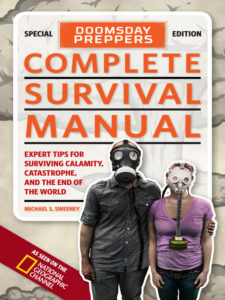Living in the U.S. or rich country won’t protect you, nor will prepping and bugging out. Prevention can.
Disconnecting from the grid put me in touch with a few people preparing themselves and their families for an apocalypse, as does just living in America. It seems that population includes many people who buy portable solar panels like the ones I bought.

I can’t criticize them. On the contrary, it occurred to me that their believing that people can live sustainably can make them great role models, in contrast to many so-called environmentalists who don’t even try to live sustainably and call for huge funding for solar and wind that are not clean, green, or renewable, as if calling them “clean,” “green,” or “renewable” would make them so.
Maybe I’m missing something, but with eight billion people on a world that can sustain about three billion, and plenty of evidence for the common pattern of overshoot and collapse, I only see one way to avoid the population dropping well below three billion, and America’s dropping well below one hundred million. Populations in overshoot don’t decrease smoothly to their environment’s carrying capacity but slingshot below it unless the population deliberately plans its reduction. We aren’t doing anything remotely like it.
I haven’t researched a doomsday prepper’s chances of surviving, but I don’t see it helping improve anyone’s odds of surviving beyond random chance. If they survived, they’d live in a doomsday environment. As their only chance for survival, everyone else’s fighting would have burned all the fuels they could have, causing more pollution, using up all available resources.
The Safest Alternative
The safest alternative I can see is for everyone to collaborate as best as possible. I’m not saying it’s possible. We’ve done comparable things in addressing the ozone hole problem and in some places outside the U.S. outlawing slavery peaceably, but such successes are rare.
Still, I see the best chance for survival, even at the individual level, as leading oneself and everyone you can to living sustainably as fast as possible. Nobody believes it possible for, say, 330 million Americans to reduce their pollution over ninety percent, but if they didn’t know I did it, they’d say for one person to do it, yet I did in 2.5 years. I’m not saying because I can others can. I’m saying because all humans for 300,000 years did it, as are many people today, we can too.
If you’re preparing to survive on your own after doomsday, I propose you consider putting that effort into prevention—that is, trying to help everyone live sustainably as soon as possible. I suggest the amount effort you put into prepping put into prevention increases you and your family’s chances of survival more. I also know from experience and research into anthropology that you’ll like living sustainably more that the increasing isolation and dependency we live in today.
Being rich doesn’t help either
I’ve also seen research that if there is a rich population with resources to protect itself in case of collapse, their resources only give them about a year, as I recall, before their population collapses as much. That is, being rich doesn’t help. Being American, European, or even a rich American or European doesn’t help in case of collapse.
Read my weekly newsletter

On initiative, leadership, the environment, and burpees